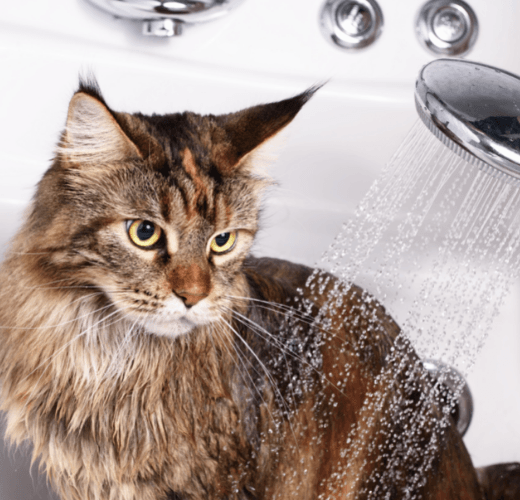Should I be bathing my cat?
While cats are typically seen as hydrophobic, keeping clean is actually very important to them! Cats are taught how to self-groom by their mothers from a very young age and as adults will spend 30-50% of their waking hours grooming themselves.
Expert groomers
When cats lick themselves with their rough tongues they stimulate the production of sebum – an oily substance that is produced at the base of each hair follicle. Sebum is spread over a cat’s coat as they lick themselves creating a waterproof covering, protecting the hair and giving their coat a healthy shine. The condition of a cat’s coat is a good indicator of their general health and can even be linked to their diet. If you ever notice their coat looking dry, flaky, greasy, or that the hair is thinning, it is likely to be a sign of poor health and you should get them checked over by your vet.
Cats have grooming covered so bathing is not something that an owner usually needs to worry about. However, you can assist your cat with regular brushing to help remove any dead skin or debris from their coat. This is particularly important with long-haired breeds, and they should be brushed daily to prevent their coats from becoming matted or causing hairballs.
Lending a hand
When cats reach their senior years, it can become difficult for them to groom effectively. A cat that is suffering from arthritis – or a cat that is obese – is likely to struggle to lick those hard-to-reach areas. If they are not able to groom themselves properly, cats can become a bit smelly. There are also occasions when a cat might get covered in something particularly dirty or smelly, for which a simple brush or wipe won’t be enough. In these circumstances, you may decide that your cat would benefit from a scrub in the tub.
Cats are unlikely to tolerate being bathed unless they were introduced to it at a young age so you will need to be prepared for some hissing or spitting if your cat becomes scared. Depending on how dirty your cat is you may decide a bath is just not worth the stress for either of you.
If you do decide to bathe your cat yourself, there are some useful tips that could help make the whole process a little less of an ordeal!
- If possible, find yourself an extra pair of hands. Even if it is just someone to pass you the shampoo or towel, it can be helpful to have some backup!
- Give your cat a good brush before getting them wet. This will help to remove as much dead hair, debris and tangles as possible before you start.
- Be prepared. Have everything you need ready and within arm’s reach. Also, make sure you close the bathroom door so your cat can’t escape!
- Never use human shampoo as it can be toxic to cats. Look for a cat-specific pet shampoo instead.
- Take things slowly and try to keep calm. If you are stressed, your cat will be able to pick up on it.
- Place a bath mat or towel down in the bath to create a non-slip surface. This will help your cat to feel more secure.
- Ensure that the water you are using is warm enough. Cats don’t like getting cold.
- Use a small cup to pour water gently over your cat rather than using a shower, which is likely to overwhelm them.
- It’s a good idea to cover your arms to protect you from scratches!
If your cat really needs a bath but you don’t feel brave enough, remember you can always call on the experts. Professional cat groomers are used to dealing with difficult customers and will be able to bathe your cat in the quickest and most stress-free way possible!
Shop All Cat
If you enjoyed this article, you may be interested in these:
Flea & Tick Prevention For Your Cat
How Do I Give My Cat Medicine?
Cat Shedding - How To Handle The Hair









